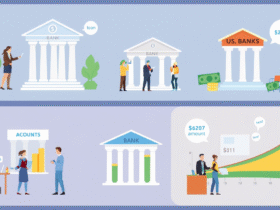Introduction
Entering adulthood is an exciting and transformative period. For many young adults, it’s the first time managing finances independently, which can be both liberating and daunting. Establishing good financial habits early on is crucial for long-term success. This comprehensive guide provides essential tips and strategies to help young adults set themselves up for financial success.
1. Understanding the Basics of Personal Finance
Budgeting
Creating a budget is the cornerstone of financial management. It involves tracking your income and expenses to ensure you are living within your means.
- Track Income and Expenses: Start by listing all sources of income and categorizing your expenses (e.g., rent, groceries, entertainment).
- Set Spending Limits: Allocate a specific amount for each category and stick to it.
- Use Budgeting Tools: Apps like Mint, YNAB (You Need A Budget), and personal finance spreadsheets can help you stay organized.
Saving
Building a savings habit is critical for financial stability and future planning.
- Emergency Fund: Aim to save at least three to six months’ worth of living expenses to cover unexpected costs.
- Automatic Savings: Set up automatic transfers from your checking account to a savings account to make saving effortless.
Understanding Credit
Credit plays a significant role in financial health, affecting your ability to get loans, rent apartments, and even get certain jobs.
- Credit Score: Learn about factors that impact your credit score, such as payment history, credit utilization, and length of credit history.
- Responsible Credit Use: Use credit cards wisely by paying off the balance in full each month to avoid interest charges and debt accumulation.
2. Setting Financial Goals
Short-Term Goals
These are financial objectives you aim to achieve within one year.
- Build an Emergency Fund: Start with a small goal, such as saving $1,000 for unexpected expenses.
- Pay Off High-Interest Debt: Prioritize paying off debts with high interest rates to reduce financial strain.
Long-Term Goals
These goals span over several years and require more planning and discipline.
- Retirement Savings: Even if retirement seems far off, start contributing to a retirement account like a 401(k) or IRA as early as possible to take advantage of compound interest.
- Buying a Home: If homeownership is a goal, begin saving for a down payment and understand the mortgage process.
3. Managing Debt Wisely
Student Loans
Many young adults graduate with student loan debt. Managing it effectively is crucial.
- Understand Your Loans: Know the terms, interest rates, and repayment options for your student loans.
- Income-Driven Repayment Plans: If you’re struggling with payments, consider an income-driven repayment plan that adjusts your monthly payment based on your income.
Credit Card Debt
Credit card debt can quickly become unmanageable if not handled properly.
- Pay More Than the Minimum: Always try to pay more than the minimum payment to reduce the principal faster.
- Balance Transfers: Look for credit cards offering 0% APR balance transfers to consolidate and pay off debt without accruing interest.
4. Investing for the Future
Understanding Investment Basics
Investing is key to growing your wealth over time.
- Types of Investments: Familiarize yourself with stocks, bonds, mutual funds, ETFs, and other investment vehicles.
- Risk Tolerance: Assess your risk tolerance to choose investments that align with your financial goals and comfort level.
Retirement Accounts
Starting to save for retirement early can significantly impact your financial future.
- Employer-Sponsored Plans: Take advantage of employer-sponsored retirement plans like 401(k)s, especially if your employer offers matching contributions.
- Individual Retirement Accounts (IRAs): Consider opening a traditional or Roth IRA for additional retirement savings options.\
5. Protecting Your Financial Health
Insurance
Having the right insurance is crucial for protecting yourself from financial setbacks.
- Health Insurance: Ensure you have adequate health insurance coverage to avoid high medical costs.
- Renters or Homeowners Insurance: Protect your belongings and home with appropriate insurance policies.
Identity Theft Protection
Safeguard your personal information to prevent identity theft.
- Monitor Accounts: Regularly check your bank and credit card statements for unauthorized transactions.
- Use Strong Passwords: Employ strong, unique passwords for your financial accounts and consider using a password manager.
6. Building Good Financial Habits
Consistent Saving
Make saving a regular habit, even if it’s a small amount.
- Pay Yourself First: Treat savings as a non-negotiable expense by setting aside money each time you get paid.
- Increase Savings Gradually: As your income grows, gradually increase the amount you save each month.
Educating Yourself
Stay informed about personal finance to make better financial decisions.
- Read Books and Blogs: Books like “Rich Dad Poor Dad” by Robert Kiyosaki and blogs like “The Simple Dollar” provide valuable financial insights.
- Take Courses: Online courses on platforms like Coursera or Udemy can enhance your financial knowledge.
7. Avoiding Common Financial Mistakes
Overspending
Living beyond your means can lead to debt and financial stress.
- Impulse Purchases: Avoid impulse buys by implementing a 24-hour rule – wait 24 hours before making a non-essential purchase.
- Lifestyle Inflation: Resist the temptation to increase your spending as your income rises.
Ignoring Retirement Savings
Delaying retirement savings can significantly impact your financial future.
- Start Early: The earlier you start saving for retirement, the more time your money has to grow through compound interest.
- Consistent Contributions: Regularly contribute to your retirement accounts, even during periods of financial strain.
8. Navigating Financial Challenges
Job Loss
Unexpected job loss can be a significant financial blow.
- Emergency Fund: Having an emergency fund can provide a financial cushion during unemployment.
- Unemployment Benefits: Research and apply for unemployment benefits to help cover expenses while you search for a new job.
Major Life Changes
Events like marriage, having children, or buying a home can impact your finances.
- Financial Planning: Plan for major life events by adjusting your budget and savings goals accordingly.
- Professional Advice: Consider consulting a financial advisor to help navigate complex financial decisions.
CODE – J9G4LHZW



Leave a Reply